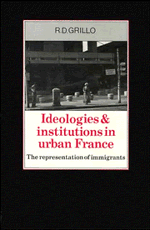Book contents
- Frontmatter
- Contents
- List of tables, figures, and maps
- Acknowledgments
- Glossary of abbreviations and acronymns
- 1 Introduction
- 2 Immigrants in France and in Lyon
- 3 Two modes of discourse: immigrés and étrangers
- 4 Urban development and the problems of housing: the “bachelors”
- 5 Housing and the “problems” of immigrant families
- 6 North African women and the French social services
- 7 In the schools and on the streets
- 8 Language
- 9 Work
- 10 “The strike is like a school”
- 11 The representation of problems and the problem of representation
- 12 Conclusion: institutional and ideological structures
- Appendix: The French school system
- Bibliography
- Maps
- Index
10 - “The strike is like a school”
Published online by Cambridge University Press: 27 August 2009
- Frontmatter
- Contents
- List of tables, figures, and maps
- Acknowledgments
- Glossary of abbreviations and acronymns
- 1 Introduction
- 2 Immigrants in France and in Lyon
- 3 Two modes of discourse: immigrés and étrangers
- 4 Urban development and the problems of housing: the “bachelors”
- 5 Housing and the “problems” of immigrant families
- 6 North African women and the French social services
- 7 In the schools and on the streets
- 8 Language
- 9 Work
- 10 “The strike is like a school”
- 11 The representation of problems and the problem of representation
- 12 Conclusion: institutional and ideological structures
- Appendix: The French school system
- Bibliography
- Maps
- Index
Summary
This chapter continues the discussion of several of the themes explored in Chapter 9, which dealt with the problems of immigrant workers in employment. Its content also provides a bridge to Chapter 11, leading us directly into an examination of the position of certain groups and individuals who operate at the “interface” of the worlds of the French and immigrants. The chapter is ultimately about them and their roles as intermediaries and interpreters between two sets of cultures.
One of the issues central to this book is what I have termed the “problem of representation.” The material presented in this chapter, which constitutes a single extended case study of a strike involving a small number of Tunisian workers, therefore illustrates what is a matter of more general concern, and is thus typical of much that occurs in Lyon. For various other reasons, however, the data are atypical. First, Lyon is an industrial city and migrant workers are concentrated in the sectors such as building and construction, mechanical engineering, and artificial textiles. The Tunisians in this case study, however, are agricultural workers, albeit in a sector that is highly industrial in character. They are employed by a market-gardening firm with premises on the out-skirts of the agglomération. Second, the commune in which they are employed, and where they live, is a middle-class suburb (Caluire) to the north of the city, which contains relatively few foreigners (5.6 percent in the 1975 census).
- Type
- Chapter
- Information
- Ideologies and Institutions in Urban FranceThe Representation of Immigrants, pp. 240 - 257Publisher: Cambridge University PressPrint publication year: 1985



